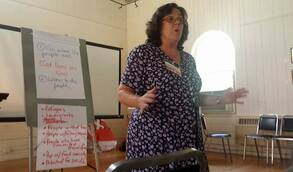 In technology, the 1.0 release sounds like the first iteration, but often it is really the release of a product at the deadline, whether or not is done. The new idea is offered to the public and the users report back their experience: what works and what does not. This may or may not be a good idea in technology, you want the app you paid for to work, right? But I'm beginning to think that it is a great idea for church. Too often we spend our time trying to perfect a new idea before we've even gotten input as to whether others want what we have to offer. Why not get started, and then find out from the users what should be different? Let them tell us, and let us listen, to what works and what doesn't, and make adjustments accordingly. Why do we presume that we know all of what others want from this new program we are creating? If it is meant to serve others (and I hope what we are doing is meant to serve others) then we need to know what those "others" are looking for. "They" probably know more about their needs than we do. We should be involving others in all of the new programs we are creating, but it seems good to also go ahead and release some of our great ideas into the wild. Lets get started, and then get feedback, and make changes. In fact, wouldn't it be cool if the church always was version 1.0? What would it mean if we assumed that changes are needed, fixes are required, that the whole church organization would benefit from being renovated? We say this sometimes, but usually not until our structures are so entrenched it would be destructive to make even small changes. Church 1.0 would be open to constant adjustment. What if tweaking is forever? It is popular in the church circles I hang with, to talk about the future of church as church 2.0. Someone will invariably reply, no we should get to 3.0. The idea they are trying to express is that we need completely new forms of church for this time and place. This is true. But do churchy folk have any idea how old version 3.0 is? Most computer programs are long past version 2 or 3. It makes me think of the pastor who talked about covid bringing churches into the twentieth century. It was great that we finally learned how to use (some) technology, but the rest of the world is already in the twenty-first century. Church 2.0 was created in the year 300. We should surely be up to version 10, or 28, or 593 by now? Right? Instead of looking for the right version of updated church we should be, what if we imagined church that is never finished. What if we asked what need to change every time a new person walks in the door, and again every time a person leaves. What if we changed when the neighborhood changes? What if we spoke the language of our neighbors, of young people, of the newest ideas of our culture? To be church 1.0, to be a beta version of church, we have to be trying something new. For small churches, one new thing at a time, but certainly one and then another. When we start a new dinner, or pantry, or moving ministry, or education series, or community conversations, whatever new ministry, we should start it with the idea that we don't know yet what it should look like. Get started! And then meet the people who come and ask them how it should be changed. Change it up next week with the fixes offered by those present. Heck, ask those attending to come and help with the fixes. Ask what should be for dinner, and are you meeting at the right time, and should the tables be set up like this, or like that. Is the serving line in the right order? Are you advertising in the right places? Assume all your planning is just to find the starting point. Most of it will need to change. And then change it! Church 1.0 has some foundational beliefs--that everyone is loved by God--and some foundational practices--we listen for Christ's good news in our lives. Everything else can be changed. Here are some things you might change: Sunday worship. Hymns. Organ and Piano. Choir. What music the choir sings. Sunday school. Coffee hour. Council meetings! The treasurer's report. When you gather, how you gather. Welcome to church 1.0. Open for editing.
0 Comments
 Small churches, or, as I describe the churches I serve, micro-churches end up spending a lot of time thinking about what it means to be church. Many of the things we grew up with--Sunday School, Choir, crowded holiday services, a pastor (or two!) at every service--are no longer options for some churches. The advantage of those changes is that we spend time asking ourselves "what is church?" And so we list some important traits of church: that it is relational, missional, focused on Jesus Christ, that it is communal, and gathers in a sacred space, it is spirit filled, it is incarnational, it is eucharistic. Not all congregations will choose all of those words, and many congregations add other descriptors. My ordination is with the Christian Church (Disciples of Christ), and I went to an Episcopal seminary; for me church is definitely Eucharistic. We are a group of people that gather around a ritualistic meal. There are many challenges for a small, eucharistic church, and one of them is how to share our meal when we have limited resources. Our recent COVID years with online church further challenged our experience of Eucharist. And so churches are wresting. If you do not have a priest, and are not having Eucharist, is the gathered community no longer church? How often do you need to have Eucharist to be church? Can the Eucharist be in the form of the reserved sacrament from another parish? Can the person who blesses the sacrament be visiting clergy, and if so, what does that do to the definition of church as "relational"? Can the elements be blessed through the miracle and zeroes and ones of Zoom? Are bagels and coffee appropriate substitutes for bread and the fruit of the vine? There is a no single right answer to these questions, but it is right, and necessary for small parishes to have discuss them, and to decide what is the right answer for their diocese, their geographical location, and for their local community. What small and micro-congregations need are creative alternatives. In one of my congregations, I bless the elements in one town while they watch, together, in the sanctuary, on zoom, and then we eat, remotely, together. In another, once a month they have breakfast church with a discussion sermon. One of the lay leaders has been authorized by the council to bless the sacrament--usually some sort of coffee cake and orange juice or coffee. In Episcopal churches sometimes a lay person trained and ordained, so that their home congregations can share the Eucharist. In others an ordained Missioner rotates among several churches, so that once every three, or five, or eight weeks, each congregation gets their turn with the Eucharist. Yoked parishes often have the pastor visiting several churches on Sunday morning. Merged parishes may switch between which building they use. My two parishes gather out-of-doors for a combined Easter in the lovely (but cold) Cathedral of the Pines. Dinner churches bless the elements, but share an actual meal. All of these are strategies for solving the problem of Eucharist, but the most important element is the discussion. What is church? What does the Eucharist mean to your congregation? How often will you have it, and how will we make that happen. Small and micro-congregations grow stronger when the have wrestled with their theology in order to make a theological decision about what it means to be a Eucharistic people.  Liz teaching outreach strategies to church folk. (White woman in blue dress in front of an easel with writing.) Liz teaching outreach strategies to church folk. (White woman in blue dress in front of an easel with writing.) I read recently a pastor suggesting these roles for a pastor: Professional Speaker, Master of Ceremonies, CEO, Counselor, Fundraiser, Human Resources Director, Pillar of Virtue. While the writer is leaving ministry for many reasons, and points out many real problems with ministry, for me what was stood out was how different my list of roles is. Having a different list or roles would not solve the challenges he has faced. His experience is real. Many are sharing it because it speaks to their hearts. My experience of ministry is quite different than his. I too am a good “professional speaker” and while I’m uncomfortable with the title Master of Ceremonies, I’m a good, although quite informal, worship leader. I also do some counseling, although I’m not overwhelmed by my parishioners lives. The small size of my churches might explain that feeling, but I think it is mostly that I don’t see it as a primary purpose of my ministry. Beyond those two items, the rest of the list is simply not my calling as a pastor. For sure, I’m not a pillar of virtue. Of course none of us are, but most importantly, I do not hide my foibles and failures. I refuse this role when people try to hoist it on me. Most importantly, I’m not a CEO, fundraiser, or human resources director. At every church I’ve served, the board holds all those roles. At my first church I accidentally took over some of those roles, but I learned from those mistakes and have not done that since. I’m instead the in-house consultant. I give advice. I ask questions. I help the council and the congregation to imagine the future. I read legal documents and notice if there is weird language. I propose alternative ways of looking at the budget. I seek out grants. I ask where they see God in their work. I look for theological foundations to the work. Sometimes I grumble about their choices. But I am absolutely not in charge. Part of why I am not CEO is because I don’t buy the idea that it is the purpose of any church to grow in finances or in people. In fact I spend a lot of time helping churches to get off the bigger is better bandwagon. I do think church is a place to grow spiritually, and so spend a lot of time creating studies of biblical texts, theology, public discourse around faith, and more. Small numbers of people join me for those studies. I design worship, speak at council meetings, provide trainings, all with the idea that one of my roles is educator. And I think that church's primary role is to serve the community, so I spend time hanging out with people who are not in the church. On the top of my list of roles would be Community Organizer. A small part of my congregation joins me in that work. The thing that makes me consider leaving is the work that is over-the-top-impossible for me: Administration. Clerical work. Details. Emails. The bulletin. Finding artwork. The calendar. The to-do list. Help me Jesus! Like literally, please take these away! My list of roles: Community Organizer is most important, Educator is most fun. Although Worship Leader is most expected, it is not most important, but also it is where I get the most positive feedback. My roles as Consultant as most meaningful, and most focused on hope for the future. Clerical Assistant is the most annoying of my roles. I think what keeps me spiritually healthiest is when I remember I’m a Theologian. I don’t do much counseling, but I ask where God is in people’s lives. I don’t do much CEOing, but I ask how God is at work in the church. I don’t run outreach programs, but I search for God in the relationships we build. Not many people come to our faith formation activities, but I love the thrill of looking for God’s way together. Not enough church people are involved in our local outreach, but the work we do makes a difference in our community. I, like most clergy, am tired. It's a wide diversity of roles, and I can't be good at them all the time. I, like most working people I know, wonder if my work is where my heart is right now. I want a weekend off with my family. I want to prioritize my home. I have great sympathy for those who cannot continue the work they thought was their calling—whether that work is church work or not. For me, now, the roles fit my skills. I'd say more, but I've got to get the bulletin finished. What are your roles as a pastor? |
My ThoughtsFor my organized thoughts, see my book Five Loaves, Two Fish, Twelve Volunteers: Developing Relational Food Ministries. In this spot are thoughts that appear for a moment--about food programs, mission, church, building community, writing, and whatever else pops into my head. History
January 2024
Categories
All
|
 RSS Feed
RSS Feed